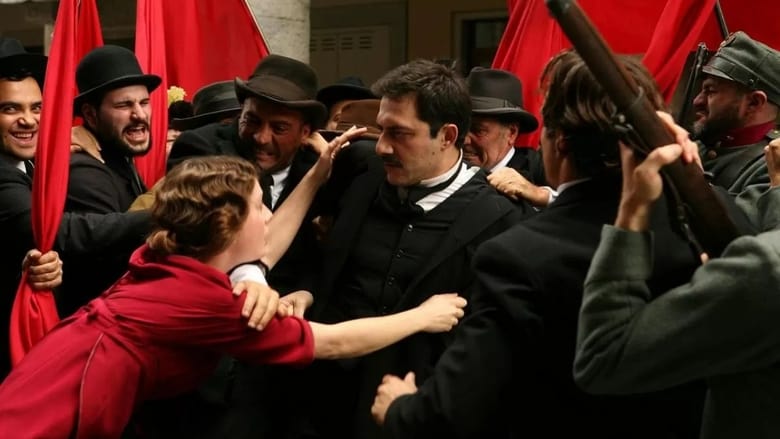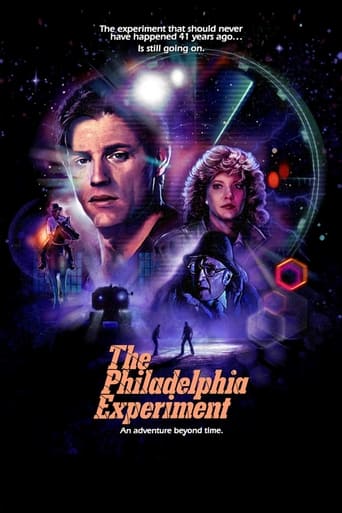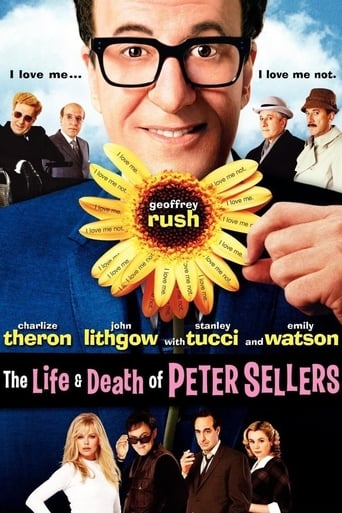Vincere (2009)
The story of the descent into madness of Mussolini's secret first wife, Ida Dasler, who was seduced by his passion and vigor but blind to the fascist dictator's many flaws.
Watch Trailer
Cast
Similar titles


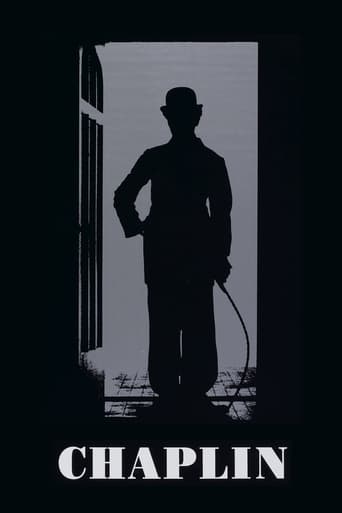

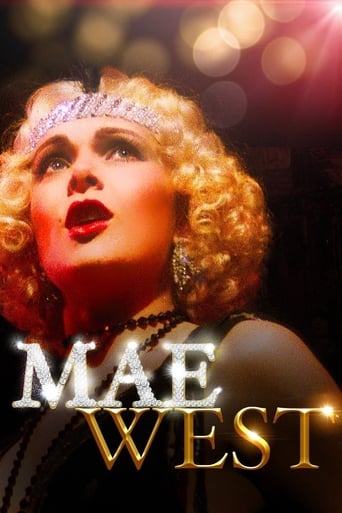
Reviews
Too much of everything
As Good As It Gets
Am i the only one who thinks........Average?
it is finally so absorbing because it plays like a lyrical road odyssey that’s also a detective story.
"Vincere" is an artful biopic that tells the story of Benito Mussolini's mistress and perhaps first wife, Ida Dalser (Giovanna Mezzogiorno). The film jumps around the time line, mainly from the point of view of Ida, with a mixture of heated political rallies and shout fests, intense love scenes (mostly early in the movie, hidden in darkness), real footage of a pompous Mussolini, and operatic melodrama.It's not a biopic of Mussolini, but we see glimpses of his early socialist and atheist convictions, his conversion to fascism, and his eventual support for the church (for politically expedient purposes until old age, judging from the history). We hear Mussolini dream of an Italy that surpasses morality and brings about fundamental changes. He's not specific, but he doesn't want to become like average folk. He wants to outdo even Napoleon.The film follows a TV documentary and two books about Ida, based on reporting by Marco Zeni. In the reports, Ida Dalser claims she married Benito Mussolini in 1914. She also had a son with him, named Benito Albino Mussolini. Historians don't have direct evidence she married Mussolini, but they have evidence he accepted responsibility for their son. For unknown reasons, he left her a year later and married Rachele Guidi after returning from the war.According to the history (not the film), his last mistress, Clara Petacci, was executed (by firing squad) and hung upside down in the Piazza Loreto (Milan) along with him. Ida might have had that to look forward to if she had been by his side (she doesn't seem like a stay at home or turn a blind eye type of wife – she would have been with him). Tragic madness is a common theme in drama, and Ida Dalser arguably has a touch of madness. Her love affair with Benito Mussolini (Filippo Timi) operatically moves from intense devotion to angry feud. She sells everything to fund his newspaper, gives him a son, and attempts to force him to divorce his wife and return her to her rightful place by his side. She won't even think of another man. Is it love, true devotion, or revenge?Most of the film tracks Ida Dalser in extremes of emotion, especially as corrupt Fascists suppress her and take her to a madhouse. She writes to everyone to try to publicize her marriage, including the pope, and she drags her son to Mussolini to dramatically express her outrage. My first thought in trying to describe Ida was, well, at least she didn't kill her son to get back at him. The movie doesn't explicitly depict her doing anything this mischievous, or perhaps the unthinkable is possible.Did she succeed in sacrificing her son to get back at Mussolini? It's possible she embellished her relationship with Mussolini and her extreme conviction rubbed off on her son. The odd thing is that this interpretation fits with Giovanna Mezzogiorno's compelling performance of Ida throughout the film. She seems in love with more than Mussolini. She wants to stand by his side and be the public wife of a dictator. For example, she won't consider signing a power of attorney to help provide financially for her son because it might be seen by (her imagined) Mussolini as disloyalty. She refuses to lie about her marriage to return home for the sake of her son.At a minimum, she was adamant in trying to embarrass Mussolini, and she did so despite the welfare of her son. (History is less fair to Ida than the film since it also implicates her publicly denouncing Mussolini as a traitor.) She's noble in her resoluteness to truth (if the marriage is true, of course). But why wouldn't she move on when Mussolini has already married someone else? Is a country better off when political scandals come out about a politician's personal love affairs? Is her resoluteness to truth really a resoluteness to power and status, or revenge?It's easier to feel sympathy for her since the Fascists also abused their power beyond any respect for justice. The film doesn't necessarily demonize Mussolini. But only someone as powerful and ruthless as a dictator is able to persecute and silence his accusers (whether wife and son, or otherwise) rather than face them in court. It's a clear case of corruption and abuse of power.We could go back and forth between the two sides eternally. If she had remained silent, she wouldn't have been in an asylum in the first place, and Fascist doctors wouldn't have been around to try to force her to lie about her marriage. However, she wouldn't have ended up in an asylum in a just and moral country. But sometimes it's best to remain silent about some truths if they aren't in your (or your son's) best interest. And so on. The film allows you to make your own interpretation and to spread the blame around as you like. The musical score has a beautiful (and loud) recurring piece that builds up dramatically and ends in low scratchy strings. The film begins and transitions emphatically, almost mimicking Mussolini's exclamation of "boom, boom, boom" as he praises a painting. It plays like a silent film in some sequences, such as a comical scene of political advocates fighting with one another as silhouettes in front of a classic movie projector.Some of the sets nicely recreate Italy of the time period (Mussolini's duel, with factories in the background, is one of the best), but you don't get a chance to linger on them and the lighting is dark. It would be interesting to compare the film on DVD to the version played at theaters to see if the DVD is any darker than intended. As it is, it's best to view the film in complete darkness to get the benefit of its subtle lighting.Note: The subtitles translate "Vincere" as a verb, meaning "to win".
Despite the inexplicable gushings from other reviewers, this is simply a bad movie; the directing, writing, acting, photography and music all bad in their own way. The first 45 minutes of the movie are confusing with no purpose; the movie jumps back and forth from different years making it almost impossible to get rolling and impenetrable to understand. By the time, Giovanna Mezzigiona is confined to a mental hospital (the last half of the movie) we just don't care, and nothing is added to the film. The film could have worked much better as a chronological story; how she met Mussolini, their subsequent relationship and should have ended with her confinement. The end credits could have told us that she never saw Mussolini again. There was absolutely no drama in the hour of the story during which she is confined. The movie tried (and failed) to do too many things: History, world wars, journalism socialism, Fascism, romance, betrayal, to name a few, and did them all poorly. The movie starts chaotically and never gets into any rhythm. The beginning was so bad that it resembled a student film. I hated the idea that the first part of the film was shot in such dark colors (it wasn't as if this was about a journey to light); in fact, it would have been better to start with a lighter palette and grow darker as both Mussolini rise and Mezzagiona's commitment follow. The music was way too intrusive and only added to the pain of watching this movie. The acting was also poor. (Mezzigiona is a major Italian actress and yet has a persistent habit in recent films of failing to connect with the audience and getting us to care about her character) Fellow IMDBers beware! This is a big whiff.
Marco Bellocchio directed and wrote (with Daniela Ceselli) this very dark version of the private life of Benito Mussolini, a portion of his life that centered on his mistress and the mother of his son, one Ida Dalser. Though the film never really reveals whether Ida Dasler and Mussolini were married (Mussolini already had a wife and child when he me the devastatingly beautiful and erotic Ida) but that simply doesn't seem to matter while watching this artistic triumph of a film. What the director does manage to portray is the life and times of Italy before, during, and after WW I, a time during which Mussolini began his influence as a socialist and ultimately founded Italian Fascism, becoming the Fascist dictator of Italy. The many permutations of the concepts of monarchism and socialism and eventually Fascism are delineated by the film, if at times as shadowy in their explanation as is the director's love of dark in lighting the screen during almost all of the action. Bellocchio uses black and white film clips throughout his film giving it a somewhat documentary flair, but the performances by the actors make this film very much a visceral drama and not a dry rehash of history. Filippo Timi gives a gripping performance as both Mussolini the ardent and handsome lover and politician whose life is always controlled by the term 'Vincere' ('Win'). Aptly, when the bulky monster Mussolini rises out of the socialism into fascism and the war the part of Mussolini is 'played' by the film clips of the real person. But as the film draws toward the end of his life, Timi once again enters the film in the role of his son Benito Albino Mussolini, a lad stricken with insanity and confined to a sanitarium. As Mussolini's mistress (aka 'wife' by her accounts) Ida Dalser, Giovanna Mezzogiorno offers one of the strongest cinematic portrayals of an important woman of history. She is simply riveting - erotic when the romance begins, faithful even when she discovers Mussolini has a wife, and uncontrollably fierce as she is confined by the government (with Mussolini's approval) to an insane asylum. This is one of those performances that will live in memory long after this film is seen and hopefully will garner awards when the Oscar season comes round. In all this is a beautifully wrought, intelligent, beautifully acted, occasionally confusing melodrama that sheds light on the man Mussolini, his rise to power, and the women who came under his influence. Recommended. Grady Harp
In the past sixty,plus years since Italian dictator,Benito Mussolini was deposed from power,he has only been painted as the brutal,power mad despot,generally depicted in films. What is little known is that he originally started out in the Italian Socialist Party,who was duped to join the Fascist movement,after World War 1. What is also less known was he was married to another woman (Ida Dalser). 'Vincere' (basically Italian for victory,or 'Win' as the film's title translates to in the English subtitled edition,here)is the sad tale of Dalser,when she fell head over heels for the young Benito Mussolini,when he was a young,head strong man in love with Marxist theory (he is shown early on dismissing the existence of God to an outraged crowd). As the years move on,the young Benito marries Ida,has one son with her,becomes seduced by the warped ideas of nationalism,which bloomed into all out Fascism. From here on, the focus is on Ida,who starts to see her Benito less & less,until she pretty much is rendered invisible to Benito (their marriage is regarded non existent,much to the chagrin of Ida),until Ida is eventually kept imprisoned in a mental hospital for life. Marco Bellochio ('Henry IV',the remake of 'Devil In The Flesh')writes & directs this chilling portrayal of a woman driven mad by circumstances beyond her control. Giovanna Messogiorno plays Ida Dalser,with passion & panache. Felppo Timi wears two hats as the young Benito Mussolini (early on,replaced by vintage black & white film clips of the actual Benito Mussolini in later years),as well as Benito Albino,his son with Ida,as a young man (who would eventually end up in the same sad ending as his mother). The rest of the cast is rounded out with the likes of Corrado Invernizzi,Fausto Russo Alesi,and others. the film also acts as a back drop for Italian social history,from 1907,until 1945,with some nice use of visual metaphors (religious images are abundant,here,as the Catholic church was an ardent supporter of the Fascist movement in the early 20th century). Another nice notch for Bellochio. Spoken in Italian with English subtitles. Not rated by the MPAA,this film contains strong language,full frontal nudity (both female & male),some strong sexual content,and disturbing images not for young eyes

